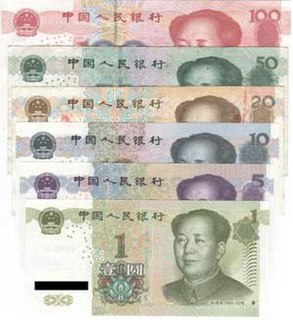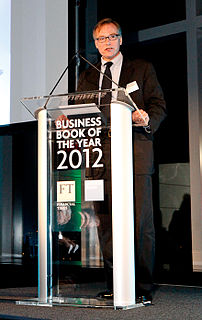
James Kynge is the principal of China Confidential and Renminbi Compass, proprietary research services from the Financial Times . [1]

James Kynge is the principal of China Confidential and Renminbi Compass, proprietary research services from the Financial Times . [1]
Kynge spent over two decades as a journalist in Asia, initially for Reuters and then as China Bureau Chief for the Financial Times between 1998 and 2005. [2] He covered many of the events during this time - including the Japanese deflation, the Tiananmen Square massacre, the rise to nationhood of the five former Soviet central Asian republics in the early 1990s, the Asian financial crisis of 1997, and China's reform and opening since 1998.
Kynge speaks fluent Mandarin, [3] and is a regular commentator on Chinese and Asian issues for media outlets including NPR, CNN and the BBC. [4]
China Confidential surveys hundreds of consumers, manufacturers, logistics companies, employers and underground banks each month, and use their network of researchers in nine cities to generate grassroots research on the big topics of the moment, often yielding calls that challenge conventional wisdom. They also conduct custom research for individual clients using their network of researchers, survey capacity and other tools. Renminbi Compass provides research coverage on asset classes as diverse as chengtou bonds, dim sum bonds, real estate, trust products, underground banking, art and antiques, as well as traditional equity fund research. Their proprietary data also reveals liquidity flows between these asset classes both within China and overseas. They estimate the monthly return that each key asset class offers.
His first book China Shakes The World: A Titan's Rise and Troubled Future - and the Challenge for America describes the development of China as a superpower; it has been translated into 19 languages. [1]
Kynge lives in Beijing, is married and has three children.
In 2016, he won the 2016 Wincott Foundation award for Financial Journalist of the Year. [5] China Shakes The World won the 2006 Financial Times and Goldman Sachs Business Book of the Year Award.

The renminbi is the official currency of the People's Republic of China and one of the world's most traded currencies, ranking as the eighth most traded currency in the world as of April 2019.
Investment banking pertains to certain activities of a financial services company or a corporate division that consist in advisory-based financial transactions on behalf of individuals, corporations, and governments. Traditionally associated with corporate finance, such a bank might assist in raising financial capital by underwriting or acting as the client's agent in the issuance of debt or equity securities. An investment bank may also assist companies involved in mergers and acquisitions (M&A) and provide ancillary services such as market making, trading of derivatives and equity securities, FICC services or research. Most investment banks maintain prime brokerage and asset management departments in conjunction with their investment research businesses. As an industry, it is broken up into the Bulge Bracket, Middle Market, and boutique market.

The Asian financial crisis was a period of financial crisis that gripped much of East Asia and Southeast Asia beginning in July 1997 and raised fears of a worldwide economic meltdown due to financial contagion. However, the recovery in 1998–1999 was rapid and worries of a meltdown subsided. The crisis started in Thailand on 2 July, with the financial collapse of the Thai baht after the Thai government was forced to float the baht due to lack of foreign currency to support its currency peg to the U.S. dollar. Capital flight ensued almost immediately, beginning an international chain reaction. At the time, Thailand had acquired a burden of foreign debt. As the crisis spread, most of Southeast Asia and later South Korea and Japan saw slumping currencies, devalued stock markets and other asset prices, and a precipitous rise in private debt.
In economics, hot money is the flow of funds from one country to another in order to earn a short-term profit on interest rate differences and/or anticipated exchange rate shifts. These speculative capital flows are called "hot money" because they can move very quickly in and out of markets, potentially leading to market instability.

Anatole Kaletsky is an economist and journalist based in the United Kingdom. He has written since 1976 for The Economist, The Financial Times and The Times of London before joining Reuters and The International Herald Tribune in 2012. He has been named Newspaper Commentator of the Year in the BBC's What the Papers Say awards, and has twice received the British Press Award for Specialist Writer of the Year.
Proprietary trading occurs when a trader trades stocks, bonds, currencies, commodities, their derivatives, or other financial instruments with the firm's own money, aka the nostro account, contrary to depositors' money, in order to make a profit for itself. Proprietary trading can create potential conflicts of interest such as insider trading and front running.

Crimeware is a class of malware designed specifically to automate cybercrime.

Bridgewater Associates is an American investment management firm founded by Ray Dalio in 1975. The firm serves institutional clients including pension funds, endowments, foundations, foreign governments, and central banks.

A financial centre (BE), financial center (AE), or financial hub, is a location with a concentration of participants in banking, asset management, insurance or financial markets with venues and supporting services for these activities to take place. Participants can include financial intermediaries, institutional investors, and issuers. Trading activity can take place on venues such as exchanges and involve clearing houses, although many transactions take place over-the-counter (OTC), that is directly between participants. Financial centres usually host companies that offer a wide range of financial services, for example relating to mergers and acquisitions, public offerings, or corporate actions; or which participate in other areas of finance, such as private equity, hedge funds, and reinsurance. Ancillary financial services include rating agencies, as well as provision of related professional services, particularly legal advice and accounting services.

The foreign exchange reserves of China are the state of foreign exchange reserves held by the People's Republic of China, comprising cash, bank deposits, bonds, and other financial assets denominated in currencies other than China's national currency. In July 2020, China's foreign exchange reserves totaled US$3.15 trillion, which is the highest foreign exchange reserves of any country.

Jiangsu Shagang Group Company Limited, Jiangsu Shagang Group, Shagang Group or Shasteel is located in Zhangjiagang, Jiangsu, China, an Economic Development Zone of the Yangtze River. According to a 2008 survey conducted by the All-China Federation of Industry and Commerce (ACFIC), the company was the largest privately owned company in China at the time. It involves the production and sales of "Shagang" brand name steel products.

The People's Republic of China has a upper middle income developing market-oriented economy that incorporates economic planning through industrial policies and strategic five-year plans. The economy consists of state-owned enterprises (SOEs) and mixed-ownership enterprises, as well as a large domestic private sector and openness to foreign businesses in a system officially described as a socialist market economy. China has the world's second largest economy when measured by nominal GDP, totaling around US$17.7 trillion in 2021, and the world's largest economy since 2016 when measured by Purchasing Power Parity (PPP). It has been the second largest by nominal GDP since 2010, with data relying on fluctuating market exchange rates. It recently overtook the economy of the European Union in 2021. A forecast states that China will become the world's largest economy in nominal GDP by 2028. China account for 18.79% share of global economy in 2022 in PPP terms
The Asian Banker is a company that provides information for the financial services industry in the form of publications, online materials such as e-newsletters, research, and conventions, and other industry gatherings. It is regarded as one of the Asian region's leading consultancies in financial services research, benchmarking and intelligence.

Financial Times Business Book of the Year Award is an annual award given to the best business book of the year as determined by the Financial Times. It aims to find the book that has 'the most compelling and enjoyable insight into modern business issues'. The award was established in 2005 and is worth £30,000. Beginning in 2010, five short-listed authors each receive £10,000, previously it was £5,000.

The United States dollar was established as the world's foremost reserve currency by the Bretton Woods Agreement of 1944. It claimed this status from sterling after the devastation of two world wars and the massive spending of the United Kingdom's gold reserves. Despite all links to gold being severed in 1971, the dollar continues to be the world's foremost reserve currency. Furthermore, the Bretton Woods Agreement also set up the global post-war monetary system by setting up rules, institutions and procedures for conducting international trade and accessing the global capital markets using the US dollar.
Dim sum bonds are bonds issued outside of China but denominated in Chinese renminbi, rather than the local currency. They are named after dim sum, a popular style of cuisine in southern China.
Real estate is a significant feature of the economy of the United Kingdom, and regulated according to Scottish and English land law. The real estate market in the United Kingdom is the largest or second-largest in Europe depending on the method of measurement. The commercial real estate market in the UK has a market size of around 250billion euros. Domestic real estate represented the largest non-financial asset in the UK, with a net worth of £5.1trillion (2014). Foreign investment plays a substantial role in the UK's real estate market, particularly in London, and foreign companies and individuals invested around £20billion in UK real estate in 2012.
Since the late-2000s, the People's Republic of China (PRC) has sought to internationalize its official currency, the Renminbi (RMB). RMB internationalization accelerated in 2009 when China established the dim sum bond market and expanded Cross-Border Trade RMB Settlement Pilot Project, which helps establish pools of offshore RMB liquidity. The RMB was the 8th-most-traded currency in the world in 2013 and the 7th-most-traded in early 2014. By the end of 2014, RMB ranked 5th as the most traded currency, according to SWIFT's report, at 2.2% of SWIFT payment behind JPY (2.7%), GBP (7.9%), EUR (28.3%) and USD (44.6%). In February 2015, RMB became the second most used currency for trade and services, and reached the ninth position in forex trading. The RMB Qualified Foreign Institutional Investor (RQFII) quotas were also extended to five other countries — the UK, Singapore, France, Korea, Germany, and Canada, each with the quotas of ¥80 billion except Canada and Singapore (¥50bn). Previously, only Hong Kong was allowed, with a ¥270 billion quota.
The Wire China is a weekly online news magazine founded by former The New York Times Shanghai correspondent David Barboza. The magazine focuses on Chinese business, economics and finance.

Digital renminbi, or Digital Currency Electronic Payment, is a central bank digital currency issued by China's central bank, the People's Bank of China. It is the first digital currency to be issued by a major economy, undergoing public testing as of April 2021. The digital RMB is legal tender and has equivalent value with other forms of renminbi, also known as the Chinese yuan (CNY), such as bills and coins.